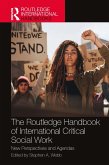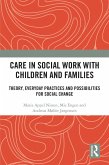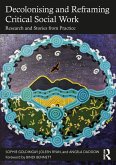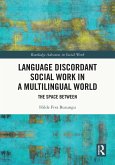The Routledge Handbook of Child and Family Social Work Research (eBook, ePUB)
Knowledge-Building, Application, and Impact
Redaktion: Fernandez, Elizabeth; L. C. Ma, Joyce; Lee, Bethany; Welbourne, Penelope
46,95 €
46,95 €
inkl. MwSt.
Sofort per Download lieferbar

23 °P sammeln
46,95 €
Als Download kaufen

46,95 €
inkl. MwSt.
Sofort per Download lieferbar

23 °P sammeln
Jetzt verschenken
Alle Infos zum eBook verschenken
46,95 €
inkl. MwSt.
Sofort per Download lieferbar
Alle Infos zum eBook verschenken

23 °P sammeln
The Routledge Handbook of Child and Family Social Work Research (eBook, ePUB)
Knowledge-Building, Application, and Impact
Redaktion: Fernandez, Elizabeth; L. C. Ma, Joyce; Lee, Bethany; Welbourne, Penelope
- Format: ePub
- Merkliste
- Auf die Merkliste
- Bewerten Bewerten
- Teilen
- Produkt teilen
- Produkterinnerung
- Produkterinnerung

Bitte loggen Sie sich zunächst in Ihr Kundenkonto ein oder registrieren Sie sich bei
bücher.de, um das eBook-Abo tolino select nutzen zu können.
Hier können Sie sich einloggen
Hier können Sie sich einloggen
Sie sind bereits eingeloggt. Klicken Sie auf 2. tolino select Abo, um fortzufahren.

Bitte loggen Sie sich zunächst in Ihr Kundenkonto ein oder registrieren Sie sich bei bücher.de, um das eBook-Abo tolino select nutzen zu können.
This handbook provides an accessible resource for all social work students, educators, practitioners and policy makers to increase their knowledge and understanding of how research into the diversity and impact of child and family social work interventions might underpin and drive policy and practice.
- Geräte: eReader
- mit Kopierschutz
- eBook Hilfe
Andere Kunden interessierten sich auch für
![The Routledge Handbook of Child and Family Social Work Research (eBook, PDF) The Routledge Handbook of Child and Family Social Work Research (eBook, PDF)]() The Routledge Handbook of Child and Family Social Work Research (eBook, PDF)46,95 €
The Routledge Handbook of Child and Family Social Work Research (eBook, PDF)46,95 €![The Routledge Handbook of International Critical Social Work (eBook, ePUB) The Routledge Handbook of International Critical Social Work (eBook, ePUB)]() The Routledge Handbook of International Critical Social Work (eBook, ePUB)47,95 €
The Routledge Handbook of International Critical Social Work (eBook, ePUB)47,95 €![Care in Social Work with Children and Families (eBook, ePUB) Care in Social Work with Children and Families (eBook, ePUB)]() Maria Appel NissenCare in Social Work with Children and Families (eBook, ePUB)41,95 €
Maria Appel NissenCare in Social Work with Children and Families (eBook, ePUB)41,95 €![Decolonising and Reframing Critical Social Work (eBook, ePUB) Decolonising and Reframing Critical Social Work (eBook, ePUB)]() Sophie GoldingayDecolonising and Reframing Critical Social Work (eBook, ePUB)41,95 €
Sophie GoldingayDecolonising and Reframing Critical Social Work (eBook, ePUB)41,95 €![Podcasting in Social Work Education (eBook, ePUB) Podcasting in Social Work Education (eBook, ePUB)]() Podcasting in Social Work Education (eBook, ePUB)39,95 €
Podcasting in Social Work Education (eBook, ePUB)39,95 €![Language Discordant Social Work in a Multilingual World (eBook, ePUB) Language Discordant Social Work in a Multilingual World (eBook, ePUB)]() Hilde Fiva BuzunguLanguage Discordant Social Work in a Multilingual World (eBook, ePUB)41,95 €
Hilde Fiva BuzunguLanguage Discordant Social Work in a Multilingual World (eBook, ePUB)41,95 €![Residential Work with the Elderly (eBook, ePUB) Residential Work with the Elderly (eBook, ePUB)]() C Paul BrearleyResidential Work with the Elderly (eBook, ePUB)54,95 €
C Paul BrearleyResidential Work with the Elderly (eBook, ePUB)54,95 €-
-
-
This handbook provides an accessible resource for all social work students, educators, practitioners and policy makers to increase their knowledge and understanding of how research into the diversity and impact of child and family social work interventions might underpin and drive policy and practice.
Dieser Download kann aus rechtlichen Gründen nur mit Rechnungsadresse in A, B, BG, CY, CZ, D, DK, EW, E, FIN, F, GR, HR, H, IRL, I, LT, L, LR, M, NL, PL, P, R, S, SLO, SK ausgeliefert werden.
Produktdetails
- Produktdetails
- Verlag: Taylor & Francis eBooks
- Erscheinungstermin: 30. September 2024
- Englisch
- ISBN-13: 9781040098110
- Artikelnr.: 72282139
- Verlag: Taylor & Francis eBooks
- Erscheinungstermin: 30. September 2024
- Englisch
- ISBN-13: 9781040098110
- Artikelnr.: 72282139
- Herstellerkennzeichnung Die Herstellerinformationen sind derzeit nicht verfügbar.
Elizabeth Fernandez, AM, PhD, MA, is Professor of Social Work, School of Social Sciences, University of New South Wales, Australia. Penelope Welbourne is Associate Professor of Social Work at Plymouth University. Bethany Lee, PhD, MSW, is the Richard P. Barth Professor of Children's Services at the University of Maryland School of Social Work. Joyce L. C. Ma is Emeritus Professor, Department of Social Work at The Chinese University of Hong Kong.
0.Introduction. Section One - The Context of Child and Family Social Work
Research. 1.Theoretical and value base of research in child and family
social work: Three epistemological approaches. 2.Children's rights and
critical children's rights studies in the context of child and family
policy, practice and research. 3.Child well-being: Children's perceptions
and experiences. 4.The Changing and Challenging Nature of Child and Family
Social Work and its Research. 5.Emerging Models, Research Designs, and
Outcome Analyses in Child and Family Social Work. 6."Evidence-Based
Practice" in Child and Family Social Work - Progress and Controversies.
7.Research Evidence and Research Evidence Use: Conceptualization and
Application to Child Protection. Section Two - Preventive and Reparative
Responses to Children and Families. 8.A critical analysis of Early
Intervention in the Irish Child Protection and Welfare system.
9.Multidimensional child poverty in Chile: dimensions that matter for child
development. 10.Helping Parents with Substance Abuse Concerns: A Case Study
on a Holistic Intervention and Support Programme for Parents Involved in
Substance Misuse in Hong Kong. 11.Responding to families and children where
there is domestic violence and coercive control. 12.Implementing a
quasi-experimental research design to explore the effectiveness of family
work in youth justice. 13.Enhancing Outcomes for Vulnerable Parents,
Children, and Communities Using the Triple P - Positive Parenting Program
System: Innovations and Future Directions. 14.Working with Fathers: A
Scoping Review. Section Three - Child Maltreatment: Causes, Consequences,
and Responses. 15.Poverty, Inequality and Child Maltreatment: What Does
Research Tell Us? 16.Developing a global typology of child protection
systems. 17.Protecting children under the law: Impact on children, young
people and families. 18.Cultural Encounters in Intervention: Complicating
Social Work. 19.Child welfare: Re-examining the risk threshold to
investigate. 20.Using Strengths-based Research and Data in Child Welfare
Assessment to Address the Overrepresentation of Black Families in U.S.
Child Welfare Programs. 21. What has COVID-19 taught us about safeguarding
children from maltreatment? Lessons learned from an international study.
22.Child sexual abuse (CSA): Dynamics, effects and responses. Section Four
- Alternate Care as an Approach to Safeguarding Children and Young People.
23.Children in family foster care: Challenges and pitfalls through an
analysis of placement disruptions. 24.Uncovering the relational complexity
of kinship care - the power of qualitative research. 25.Therapeutic
residential care: Practice components and barriers. 26.Understanding
educational outcomes for children in care: Well-being, engagement and
attainment in school. 27.Developmental Assets and Tutoring: Keys to
Improving Educational Outcomes in the Ontario Looking After Children
Project. 28.Nurturing family and social relationships while in care:
Researching family contact and visitation. 29.First Families in context:
the challenges of parent-carer partnership in out-of-home care.
30.Reunification in out-of-home care: Patterns and Predictors. 31.The
Family Reunification Process in Child Welfare: The Challenge of Providing
the Right Services at the Right Time. 32.Researching Transitions from Care:
Lessons from a Longitudinal Study of Experiences and Outcomes of Young
People. 33.Resilience of adult care leavers in Australia. 34.Coming Out in
the Care System: Participatory Research with Care Experienced LGBTQ+ young
people in England. 35. Adoption from care: Evolving directions in policy
and practice from a comparative perspective. 36.Facilitating permanence and
promoting the wellbeing of abused and neglected children through open
adoption from care. 37.Forty years of research Adoption and Birth Fathers.
Section Five - Intervention: Therapeutic Responses to Vulnerable Children,
Youth, and Families. 38.The effectiveness of mental health and relational
interventions for children in foster and kinship care. 39. Young Carers in
the UK. 40.Investigating the Effectiveness of Resilience Interventions in
Australian Youth and Its Variability Across Refugee and Non-Refugee
Samples. 41.The Development of an Indigenous Connectedness Framework for
Child Wellbeing. 42.Parent and family peer advocacy in child welfare:
Transforming research, policy, and practice. 43.Integrated, Victim-Centred
Family Therapy Following Parental Sexual Assault. Section Six - Child and
Family Social Work in the Global Context. 44.Working with children from
refugee and forcibly displaced backgrounds: Throw the "rule book" out!
45.Child trafficking and exploitation: Social work practice and children's
rights. 46.Breaking Barriers or Building Walls? Strategies to overcome the
barriers to help-seeking among Adverse Childhood Experiences (ACEs)
survivors from refugee backgrounds. 47. Responding to the long term and
changing needs of Unaccompanied and Separated Syrian children in Jordan:
Learnings and implications for their transition to adulthood. 48.The
Development of Child Protection Systems in Southeast Asia. 49.Child Labour
in rural and urban Ghana: Stakeholders and Parental Perceptions of Working
Children and Culture-appropriate Assessment. 50.Child Neglect and
Inadequate Supervision in Policies in Low- and Middle-Income Countries.
51.Understanding social media in adoptee digital diasporas: Korean
Australian intercountry adoption experiences. 52.Building resilience
following major trauma: Learnings from children of the Shoah.
Research. 1.Theoretical and value base of research in child and family
social work: Three epistemological approaches. 2.Children's rights and
critical children's rights studies in the context of child and family
policy, practice and research. 3.Child well-being: Children's perceptions
and experiences. 4.The Changing and Challenging Nature of Child and Family
Social Work and its Research. 5.Emerging Models, Research Designs, and
Outcome Analyses in Child and Family Social Work. 6."Evidence-Based
Practice" in Child and Family Social Work - Progress and Controversies.
7.Research Evidence and Research Evidence Use: Conceptualization and
Application to Child Protection. Section Two - Preventive and Reparative
Responses to Children and Families. 8.A critical analysis of Early
Intervention in the Irish Child Protection and Welfare system.
9.Multidimensional child poverty in Chile: dimensions that matter for child
development. 10.Helping Parents with Substance Abuse Concerns: A Case Study
on a Holistic Intervention and Support Programme for Parents Involved in
Substance Misuse in Hong Kong. 11.Responding to families and children where
there is domestic violence and coercive control. 12.Implementing a
quasi-experimental research design to explore the effectiveness of family
work in youth justice. 13.Enhancing Outcomes for Vulnerable Parents,
Children, and Communities Using the Triple P - Positive Parenting Program
System: Innovations and Future Directions. 14.Working with Fathers: A
Scoping Review. Section Three - Child Maltreatment: Causes, Consequences,
and Responses. 15.Poverty, Inequality and Child Maltreatment: What Does
Research Tell Us? 16.Developing a global typology of child protection
systems. 17.Protecting children under the law: Impact on children, young
people and families. 18.Cultural Encounters in Intervention: Complicating
Social Work. 19.Child welfare: Re-examining the risk threshold to
investigate. 20.Using Strengths-based Research and Data in Child Welfare
Assessment to Address the Overrepresentation of Black Families in U.S.
Child Welfare Programs. 21. What has COVID-19 taught us about safeguarding
children from maltreatment? Lessons learned from an international study.
22.Child sexual abuse (CSA): Dynamics, effects and responses. Section Four
- Alternate Care as an Approach to Safeguarding Children and Young People.
23.Children in family foster care: Challenges and pitfalls through an
analysis of placement disruptions. 24.Uncovering the relational complexity
of kinship care - the power of qualitative research. 25.Therapeutic
residential care: Practice components and barriers. 26.Understanding
educational outcomes for children in care: Well-being, engagement and
attainment in school. 27.Developmental Assets and Tutoring: Keys to
Improving Educational Outcomes in the Ontario Looking After Children
Project. 28.Nurturing family and social relationships while in care:
Researching family contact and visitation. 29.First Families in context:
the challenges of parent-carer partnership in out-of-home care.
30.Reunification in out-of-home care: Patterns and Predictors. 31.The
Family Reunification Process in Child Welfare: The Challenge of Providing
the Right Services at the Right Time. 32.Researching Transitions from Care:
Lessons from a Longitudinal Study of Experiences and Outcomes of Young
People. 33.Resilience of adult care leavers in Australia. 34.Coming Out in
the Care System: Participatory Research with Care Experienced LGBTQ+ young
people in England. 35. Adoption from care: Evolving directions in policy
and practice from a comparative perspective. 36.Facilitating permanence and
promoting the wellbeing of abused and neglected children through open
adoption from care. 37.Forty years of research Adoption and Birth Fathers.
Section Five - Intervention: Therapeutic Responses to Vulnerable Children,
Youth, and Families. 38.The effectiveness of mental health and relational
interventions for children in foster and kinship care. 39. Young Carers in
the UK. 40.Investigating the Effectiveness of Resilience Interventions in
Australian Youth and Its Variability Across Refugee and Non-Refugee
Samples. 41.The Development of an Indigenous Connectedness Framework for
Child Wellbeing. 42.Parent and family peer advocacy in child welfare:
Transforming research, policy, and practice. 43.Integrated, Victim-Centred
Family Therapy Following Parental Sexual Assault. Section Six - Child and
Family Social Work in the Global Context. 44.Working with children from
refugee and forcibly displaced backgrounds: Throw the "rule book" out!
45.Child trafficking and exploitation: Social work practice and children's
rights. 46.Breaking Barriers or Building Walls? Strategies to overcome the
barriers to help-seeking among Adverse Childhood Experiences (ACEs)
survivors from refugee backgrounds. 47. Responding to the long term and
changing needs of Unaccompanied and Separated Syrian children in Jordan:
Learnings and implications for their transition to adulthood. 48.The
Development of Child Protection Systems in Southeast Asia. 49.Child Labour
in rural and urban Ghana: Stakeholders and Parental Perceptions of Working
Children and Culture-appropriate Assessment. 50.Child Neglect and
Inadequate Supervision in Policies in Low- and Middle-Income Countries.
51.Understanding social media in adoptee digital diasporas: Korean
Australian intercountry adoption experiences. 52.Building resilience
following major trauma: Learnings from children of the Shoah.
0.Introduction. Section One - The Context of Child and Family Social Work
Research. 1.Theoretical and value base of research in child and family
social work: Three epistemological approaches. 2.Children's rights and
critical children's rights studies in the context of child and family
policy, practice and research. 3.Child well-being: Children's perceptions
and experiences. 4.The Changing and Challenging Nature of Child and Family
Social Work and its Research. 5.Emerging Models, Research Designs, and
Outcome Analyses in Child and Family Social Work. 6."Evidence-Based
Practice" in Child and Family Social Work - Progress and Controversies.
7.Research Evidence and Research Evidence Use: Conceptualization and
Application to Child Protection. Section Two - Preventive and Reparative
Responses to Children and Families. 8.A critical analysis of Early
Intervention in the Irish Child Protection and Welfare system.
9.Multidimensional child poverty in Chile: dimensions that matter for child
development. 10.Helping Parents with Substance Abuse Concerns: A Case Study
on a Holistic Intervention and Support Programme for Parents Involved in
Substance Misuse in Hong Kong. 11.Responding to families and children where
there is domestic violence and coercive control. 12.Implementing a
quasi-experimental research design to explore the effectiveness of family
work in youth justice. 13.Enhancing Outcomes for Vulnerable Parents,
Children, and Communities Using the Triple P - Positive Parenting Program
System: Innovations and Future Directions. 14.Working with Fathers: A
Scoping Review. Section Three - Child Maltreatment: Causes, Consequences,
and Responses. 15.Poverty, Inequality and Child Maltreatment: What Does
Research Tell Us? 16.Developing a global typology of child protection
systems. 17.Protecting children under the law: Impact on children, young
people and families. 18.Cultural Encounters in Intervention: Complicating
Social Work. 19.Child welfare: Re-examining the risk threshold to
investigate. 20.Using Strengths-based Research and Data in Child Welfare
Assessment to Address the Overrepresentation of Black Families in U.S.
Child Welfare Programs. 21. What has COVID-19 taught us about safeguarding
children from maltreatment? Lessons learned from an international study.
22.Child sexual abuse (CSA): Dynamics, effects and responses. Section Four
- Alternate Care as an Approach to Safeguarding Children and Young People.
23.Children in family foster care: Challenges and pitfalls through an
analysis of placement disruptions. 24.Uncovering the relational complexity
of kinship care - the power of qualitative research. 25.Therapeutic
residential care: Practice components and barriers. 26.Understanding
educational outcomes for children in care: Well-being, engagement and
attainment in school. 27.Developmental Assets and Tutoring: Keys to
Improving Educational Outcomes in the Ontario Looking After Children
Project. 28.Nurturing family and social relationships while in care:
Researching family contact and visitation. 29.First Families in context:
the challenges of parent-carer partnership in out-of-home care.
30.Reunification in out-of-home care: Patterns and Predictors. 31.The
Family Reunification Process in Child Welfare: The Challenge of Providing
the Right Services at the Right Time. 32.Researching Transitions from Care:
Lessons from a Longitudinal Study of Experiences and Outcomes of Young
People. 33.Resilience of adult care leavers in Australia. 34.Coming Out in
the Care System: Participatory Research with Care Experienced LGBTQ+ young
people in England. 35. Adoption from care: Evolving directions in policy
and practice from a comparative perspective. 36.Facilitating permanence and
promoting the wellbeing of abused and neglected children through open
adoption from care. 37.Forty years of research Adoption and Birth Fathers.
Section Five - Intervention: Therapeutic Responses to Vulnerable Children,
Youth, and Families. 38.The effectiveness of mental health and relational
interventions for children in foster and kinship care. 39. Young Carers in
the UK. 40.Investigating the Effectiveness of Resilience Interventions in
Australian Youth and Its Variability Across Refugee and Non-Refugee
Samples. 41.The Development of an Indigenous Connectedness Framework for
Child Wellbeing. 42.Parent and family peer advocacy in child welfare:
Transforming research, policy, and practice. 43.Integrated, Victim-Centred
Family Therapy Following Parental Sexual Assault. Section Six - Child and
Family Social Work in the Global Context. 44.Working with children from
refugee and forcibly displaced backgrounds: Throw the "rule book" out!
45.Child trafficking and exploitation: Social work practice and children's
rights. 46.Breaking Barriers or Building Walls? Strategies to overcome the
barriers to help-seeking among Adverse Childhood Experiences (ACEs)
survivors from refugee backgrounds. 47. Responding to the long term and
changing needs of Unaccompanied and Separated Syrian children in Jordan:
Learnings and implications for their transition to adulthood. 48.The
Development of Child Protection Systems in Southeast Asia. 49.Child Labour
in rural and urban Ghana: Stakeholders and Parental Perceptions of Working
Children and Culture-appropriate Assessment. 50.Child Neglect and
Inadequate Supervision in Policies in Low- and Middle-Income Countries.
51.Understanding social media in adoptee digital diasporas: Korean
Australian intercountry adoption experiences. 52.Building resilience
following major trauma: Learnings from children of the Shoah.
Research. 1.Theoretical and value base of research in child and family
social work: Three epistemological approaches. 2.Children's rights and
critical children's rights studies in the context of child and family
policy, practice and research. 3.Child well-being: Children's perceptions
and experiences. 4.The Changing and Challenging Nature of Child and Family
Social Work and its Research. 5.Emerging Models, Research Designs, and
Outcome Analyses in Child and Family Social Work. 6."Evidence-Based
Practice" in Child and Family Social Work - Progress and Controversies.
7.Research Evidence and Research Evidence Use: Conceptualization and
Application to Child Protection. Section Two - Preventive and Reparative
Responses to Children and Families. 8.A critical analysis of Early
Intervention in the Irish Child Protection and Welfare system.
9.Multidimensional child poverty in Chile: dimensions that matter for child
development. 10.Helping Parents with Substance Abuse Concerns: A Case Study
on a Holistic Intervention and Support Programme for Parents Involved in
Substance Misuse in Hong Kong. 11.Responding to families and children where
there is domestic violence and coercive control. 12.Implementing a
quasi-experimental research design to explore the effectiveness of family
work in youth justice. 13.Enhancing Outcomes for Vulnerable Parents,
Children, and Communities Using the Triple P - Positive Parenting Program
System: Innovations and Future Directions. 14.Working with Fathers: A
Scoping Review. Section Three - Child Maltreatment: Causes, Consequences,
and Responses. 15.Poverty, Inequality and Child Maltreatment: What Does
Research Tell Us? 16.Developing a global typology of child protection
systems. 17.Protecting children under the law: Impact on children, young
people and families. 18.Cultural Encounters in Intervention: Complicating
Social Work. 19.Child welfare: Re-examining the risk threshold to
investigate. 20.Using Strengths-based Research and Data in Child Welfare
Assessment to Address the Overrepresentation of Black Families in U.S.
Child Welfare Programs. 21. What has COVID-19 taught us about safeguarding
children from maltreatment? Lessons learned from an international study.
22.Child sexual abuse (CSA): Dynamics, effects and responses. Section Four
- Alternate Care as an Approach to Safeguarding Children and Young People.
23.Children in family foster care: Challenges and pitfalls through an
analysis of placement disruptions. 24.Uncovering the relational complexity
of kinship care - the power of qualitative research. 25.Therapeutic
residential care: Practice components and barriers. 26.Understanding
educational outcomes for children in care: Well-being, engagement and
attainment in school. 27.Developmental Assets and Tutoring: Keys to
Improving Educational Outcomes in the Ontario Looking After Children
Project. 28.Nurturing family and social relationships while in care:
Researching family contact and visitation. 29.First Families in context:
the challenges of parent-carer partnership in out-of-home care.
30.Reunification in out-of-home care: Patterns and Predictors. 31.The
Family Reunification Process in Child Welfare: The Challenge of Providing
the Right Services at the Right Time. 32.Researching Transitions from Care:
Lessons from a Longitudinal Study of Experiences and Outcomes of Young
People. 33.Resilience of adult care leavers in Australia. 34.Coming Out in
the Care System: Participatory Research with Care Experienced LGBTQ+ young
people in England. 35. Adoption from care: Evolving directions in policy
and practice from a comparative perspective. 36.Facilitating permanence and
promoting the wellbeing of abused and neglected children through open
adoption from care. 37.Forty years of research Adoption and Birth Fathers.
Section Five - Intervention: Therapeutic Responses to Vulnerable Children,
Youth, and Families. 38.The effectiveness of mental health and relational
interventions for children in foster and kinship care. 39. Young Carers in
the UK. 40.Investigating the Effectiveness of Resilience Interventions in
Australian Youth and Its Variability Across Refugee and Non-Refugee
Samples. 41.The Development of an Indigenous Connectedness Framework for
Child Wellbeing. 42.Parent and family peer advocacy in child welfare:
Transforming research, policy, and practice. 43.Integrated, Victim-Centred
Family Therapy Following Parental Sexual Assault. Section Six - Child and
Family Social Work in the Global Context. 44.Working with children from
refugee and forcibly displaced backgrounds: Throw the "rule book" out!
45.Child trafficking and exploitation: Social work practice and children's
rights. 46.Breaking Barriers or Building Walls? Strategies to overcome the
barriers to help-seeking among Adverse Childhood Experiences (ACEs)
survivors from refugee backgrounds. 47. Responding to the long term and
changing needs of Unaccompanied and Separated Syrian children in Jordan:
Learnings and implications for their transition to adulthood. 48.The
Development of Child Protection Systems in Southeast Asia. 49.Child Labour
in rural and urban Ghana: Stakeholders and Parental Perceptions of Working
Children and Culture-appropriate Assessment. 50.Child Neglect and
Inadequate Supervision in Policies in Low- and Middle-Income Countries.
51.Understanding social media in adoptee digital diasporas: Korean
Australian intercountry adoption experiences. 52.Building resilience
following major trauma: Learnings from children of the Shoah.







